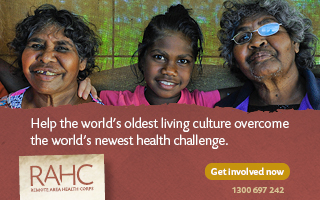Highlight news

The Australian Government has extended the Remote Area Health Corps (RAHC) to provide 12-week paid placements for General Practitioners in Aboriginal Community-Controlled Health Organisations across Australia. Until recently the program covered paid placements of between 3 – 12 weeks in the Northern Territory only. The funding variation will cover the health professionals whilst on placement plus an additional two weeks where self-isolation is required.
This initiative aims to address the workforce shortfalls resulting from the COVID-19 pandemic.
Experienced GP Trevor Tierney has undertaken numerous placements in the Northern Territory with RAHC since “retiring” in 2011. Working in Central Australia and the Top End has given Dr Tierney a chance to indulge his interest in Aboriginal culture while maintaining skills and meeting the need for medical services in isolated communities.
When he stopped being a solo GP at Bonalbo in Northern NSW aged 65, Dr Tierney had already enjoyed a remarkable career, taking him from Gunnedah to many places including Newcastle, Toowoomba, Darwin and the Antarctic.
At Bonalbo Dr Tierney worked with a sizeable Aboriginal community and came to understand their unique medical needs. This made for a relatively seamless transition to remote work, although Dr Tierney notes that every Aboriginal community has cultural differences.
Dr Tierney said RAHC is an excellent employer who provide full support and flexibility, and the experience of working remotely has numerous benefits. “Anyone taking on this role sees traditional Aboriginal culture. You also see a lot of chronic diseases that you won’t see elsewhere,” says Trevor. “For example, Wadeye west of Darwin has the highest incidence of rheumatic heart disease anywhere in the world. “There’s an incredibly broad spectrum of chronic disease and acute disease among these communities which you will never see anywhere else."
“This is an invaluable experience because when you do encounter it in an urban area you’ll spot it and everyone will think you’re the smartest doctor on the planet!” says Dr Tierney. Dr Tierney says RAHC takes care of all travel arrangements, provides safe accommodation and support.
“It’s very interesting medicine. It’s great to have some A&E skill and experience with chronic disease and renal failure. “At the community clinic, you work closely with the nurse supervisor and district medical officers as part of a team. "I can’t speak too highly of RAHC and the opportunities they provide.”
For more information visit the RAHC website.
All news

The Australian Government has extended the Remote Area Health Corps (RAHC) to provide 12-week paid placements for General Practitioners in Aboriginal Community-Controlled Health Organisations across Australia. Until recently the program covered paid placements of between 3 – 12 weeks in the Northern Territory only. The funding variation will cover the health professionals whilst on placement plus an additional two weeks where self-isolation is required.
This initiative aims to address the workforce shortfalls resulting from the COVID-19 pandemic.
Experienced GP Trevor Tierney has undertaken numerous placements in the Northern Territory with RAHC since “retiring” in 2011. Working in Central Australia and the Top End has given Dr Tierney a chance to indulge his interest in Aboriginal culture while maintaining skills and meeting the need for medical services in isolated communities.
When he stopped being a solo GP at Bonalbo in Northern NSW aged 65, Dr Tierney had already enjoyed a remarkable career, taking him from Gunnedah to many places including Newcastle, Toowoomba, Darwin and the Antarctic.
At Bonalbo Dr Tierney worked with a sizeable Aboriginal community and came to understand their unique medical needs. This made for a relatively seamless transition to remote work, although Dr Tierney notes that every Aboriginal community has cultural differences.
Dr Tierney said RAHC is an excellent employer who provide full support and flexibility, and the experience of working remotely has numerous benefits. “Anyone taking on this role sees traditional Aboriginal culture. You also see a lot of chronic diseases that you won’t see elsewhere,” says Trevor. “For example, Wadeye west of Darwin has the highest incidence of rheumatic heart disease anywhere in the world. “There’s an incredibly broad spectrum of chronic disease and acute disease among these communities which you will never see anywhere else."
“This is an invaluable experience because when you do encounter it in an urban area you’ll spot it and everyone will think you’re the smartest doctor on the planet!” says Dr Tierney. Dr Tierney says RAHC takes care of all travel arrangements, provides safe accommodation and support.
“It’s very interesting medicine. It’s great to have some A&E skill and experience with chronic disease and renal failure. “At the community clinic, you work closely with the nurse supervisor and district medical officers as part of a team. "I can’t speak too highly of RAHC and the opportunities they provide.”
For more information visit the RAHC website.

